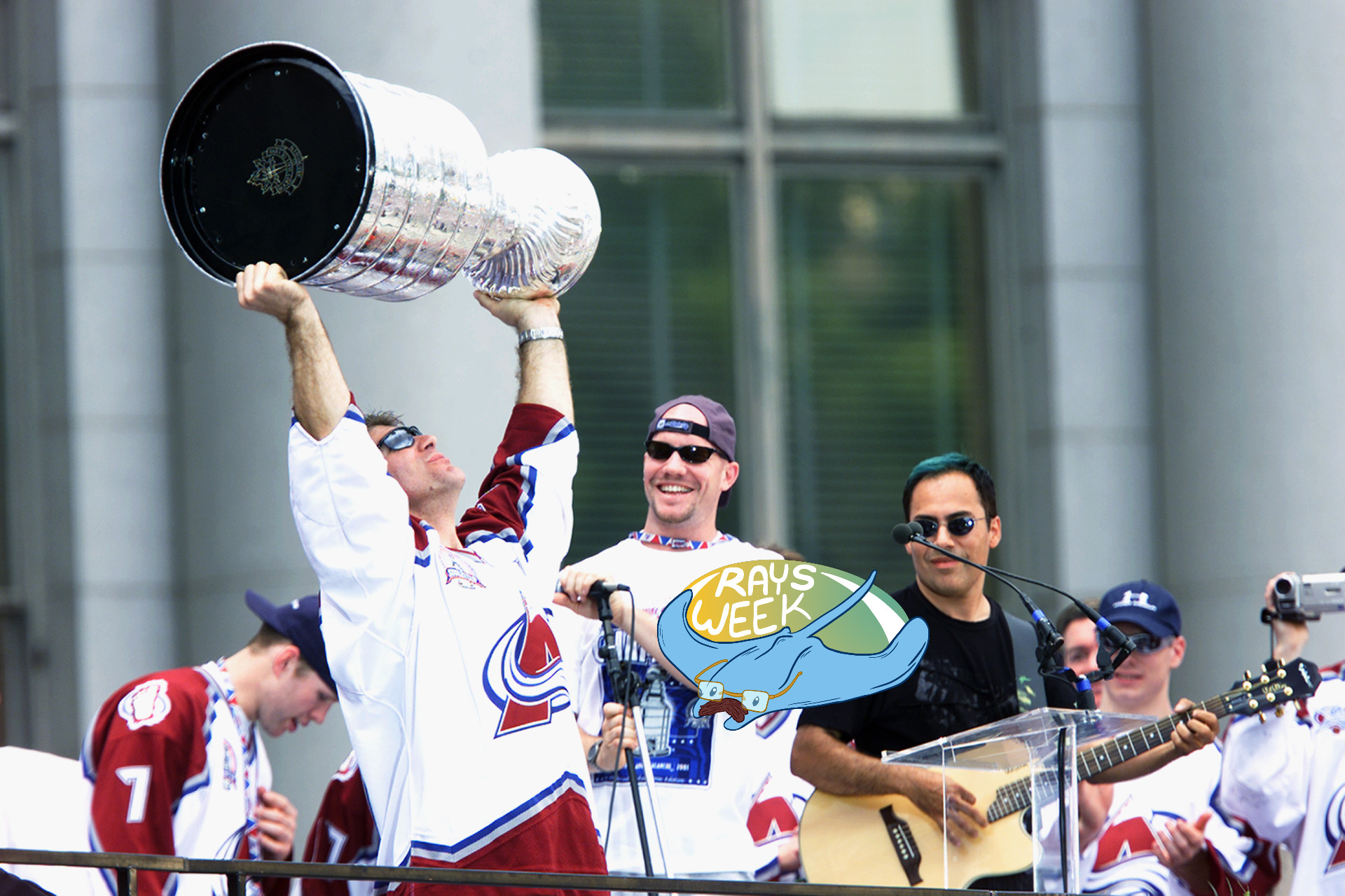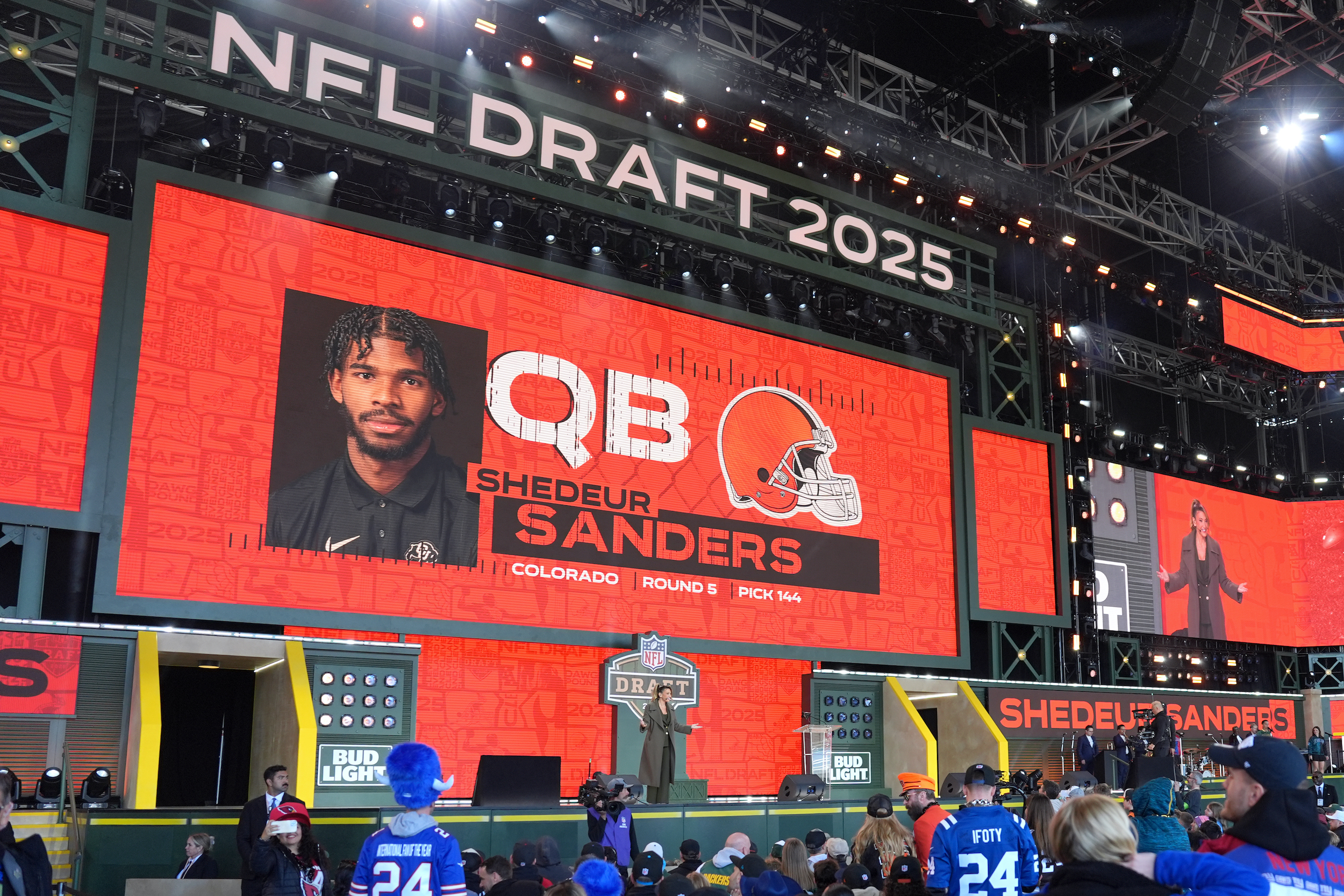Practically every Stanley Cup Playoff has at least one veteran sentimental favorite who's never won it all before and might just be getting his last shot, like Shea Weber in 2021, or Joe Pavelski in 2020, or Joe Thornton every year since 1919. These guys, more often than not, have built up impressive career stats while always ultimately remaining on the outside looking in. Typically, if they're getting up in years and their team doesn't feel close to a title, these players will maneuver their way to a contender. A Cup becomes their one real priority at this point in their careers, the ultimate accomplishment that can cement—even transform—a legacy. All of these guys are chasing what Ray Bourque got to enjoy in 2001.
Bourque was a transcendentally great defenseman across the '80s and '90s. Drafted eighth overall out of the QMJHL in 1979—part of a loaded, supersized class due to the league's lowering of its minimum age—Bourque stepped onto the ice in that same year for the Boston Bruins and immediately became a points-producing machine. Even in the shadow cast by Bobby Orr, who played his last game for the Bruins in '75, Bourque made his own way as a Boston legend with his pinpoint accurate shot, his ability to impose his will on the ice, and the humble consistency with which he led his team. He won the Calder and earned an all-star spot as a rookie, then just kept adding accolades from there. He averaged at least a point per game in 14 out of 22 NHL seasons, won the Norris five times and finished second six times, set all kinds of career counting records for a defenseman, and became the longest-serving captain in NHL history until Steve Yzerman later passed him.
The Bruins of that era, however, were so peculiar that I can hardly wrap my head around them. After they won the Stanley Cup in 1972, they went on to make the NHL playoffs the next 24 seasons in a row. In those 24 seasons, which included Bourque's first 17 years as a pro, the Bruins never hoisted a Cup again. In fact, only twice did Bourque ever even make it to the Final, and in each of those two appearances Boston was trounced by the dynasty Oilers by a combined tally of eight games to one. How weird and frustrating that must have been to experience as a fan or a player: blessed to never experience a down year, yet cursed to see that hope burn up in failure every single time.
Into the '90s, as Bourque got older, the results worsened. In '93, the Bruins were swept out of the first round by the Sabres after five straight years of advancing to at least the second round and usually farther. After falling in the second round to the Devils the next year, Boston would suffer two more five-game exits. In '96–97, the bottom finally fell out, as a carousel of flailing goaltenders and the loss of Hall-of-Fame forward Cam Neely combined to send the Bruins to the very bottom of the NHL.
With the emergence of Byron Dafoe in net, the acquisition of players like Jason Allison and Dmitri Khristich, plus the new high draft picks Sergei Samsonov and Joe Thornton, the Bruins were quickly able to rebound enough to return to the playoffs. Their positive momentum was halted, however, in the 1999–2000 season, when the Bruins traded away Khristich and suffered a plethora of injuries that dragged them back down to the basement. Making matters worse in February was Marty McSorley's disturbing attack on the Canucks' Donald Brashear, which got the Bruins enforcer convicted of assault and essentially ostracized from the NHL.
So the vibes around Boston were very bad, and by this point Bourque was 39 years old, even if he was still logging more ice time than anyone else on the team. He knew that the end of his career was nearing, and his Bruins weren't anywhere close to winning the Cup. He also knew that it could be mutually beneficial if he went to a contender and the Bruins received a haul of younger players, and so Bourque formally requested a trade from GM Harry Sinden ahead of the deadline in March. While the initial plan was to keep him in the region where his life was firmly established—somewhere like New Jersey or Philadelphia—it was the Colorado Avalanche who stepped up and put together the package that got Bourque away from the city where he became an icon. For the first time since he was a teenager, Bourque would move away from his family and his home to play with unfamiliar teammates in an unfamiliar city.
"A week before the trade happened, I asked to be traded. It was something that I was really mulling over for quite a while, for probably about a month, month and a half," Bourque said in the aftermath of the deal. "I wasn't playing real well. The team wasn't doing real good, and I thought that a change might be good and might be needed.
"I'd like to compete for the Cup again and have another crack before I'm done," he added.
He wouldn't get his wish in 2000. The Avalanche had a fearsome roster headlined by Patrick Roy, Joe Sakic, and Peter Forsberg, and Bourque became a key piece who recorded 14 points in 14 regular-season games and went on to average a staggering 29:38 of ice time in the postseason. But the team fell just short of a third-period comeback against the Dallas Stars in Game 7 of the conference final. With 15 seconds left, a potential game-tying shot by Bourque took a deflection and hit the post.
Bourque decided to return to the Avs for the following season, and in doing so he became part of one of the best teams in NHL history. Led by a legendary 54-goal, 118-point season from Sakic and augmented by breakout youngsters like Milan Hejduk, Alex Tanguay, and Chris Drury, the Avalanche piled up 118 points to win the Presidents' Trophy. Bourque, for his part, picked up the slack after an injury to Adam Foote and the offseason loss of another key defenseman in Sandis Ozolinsh, playing 80 games and averaging over 26 minutes of ice time. He got a huge ovation, too, when he returned to Boston as a member of the opposing team. Everyone back home, it seemed, was rooting for the Avs to get him that Cup. There were no hard feelings here.
By the end of the regular season, Foote was healthy and Rob Blake came over from Los Angeles as a major reinforcement, and that blue-line trio was ubiquitous in the playoffs, where each of them played over 28 minutes a night while Roy put up a goals-against average of just 1.70. The Avs swept the Canucks in the first round, avoided the fate of their arch-rival Red Wings by muscling past the underdog Kings in seven games, then dispatched the Blues in five to earn a date with the Devils.
In a tough back-and-forth series that pitted two elite goalies and went the distance, the Avalanche emerged with their hands raised in victory. In Game 3, Bourque scored the game-winner at the start of the third period, and in a pair of must-win games at the end, he finished plus-5. Winning the Cup would have been a feel-good moment no matter how much Bourque actually contributed to the champs, but the fact that, at the very end of his career, he could still be one of the best players on such an emphatically great team elevates his legend even higher.
It's a fun game to play, in the moments after an NHL season ends, to try and guess which deserving veteran will be honored by his captain and handed the Cup to hoist before everyone else. In Denver on this night, there was no suspense at all. In fact, Sakic didn't even soak in his own moment with the trophy before he passed it off to Bourque, and the captain refused to take it back until Bourque skated a lap with it. Bourque had played 1,826 games in the NHL, and nobody else had ever waited that long for this moment to come.
This tiny fraction of Bourque's career made such an impact that the Avs even retired his number the following season, after Bourque announced his retirement. But even after he skated off the rink in celebration, there was still another city left to share his joy with. Three days later, Bourque took the Cup to City Hall Plaza in Boston, where something like 20,000 fans showed up to bask in its glow.
While Bourque's win at the time stood out in a city whose teams were all struggling for relevancy, in retrospect it looks like a prologue to the exhausting era of dominance that Boston sports would soon savor. And in the NHL, the memory of Bourque with the Cup can be a kind of symbol of hope for guys like Thornton, Ryan Suter, Brent Burns, Zach Parise, or any other player who hasn't had their name engraved on the Cup and can see the end is quickly approaching. Sometimes, a storybook ending isn't confined to storybooks.






